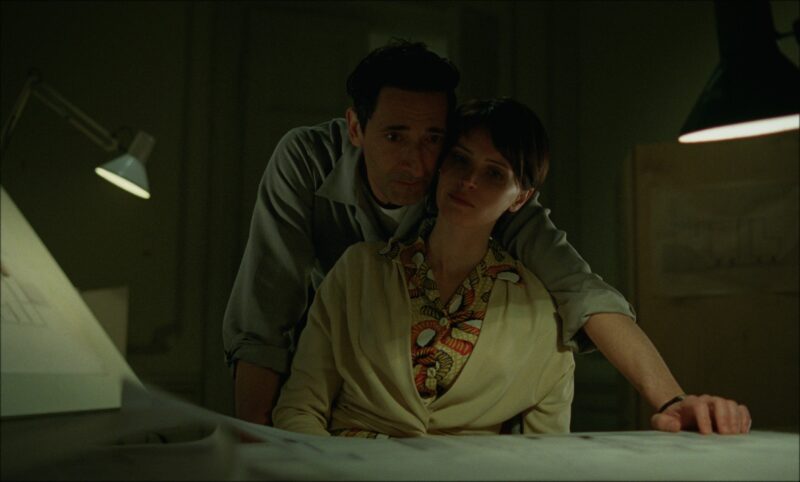In the months leading up to the release of The Brutalist, I avoided learning anything about the movie. This was not an attempt to guard against spoilers: I simply had no desire to see it. I knew only that Adrien Brody was in it and that it was long. I figured it must be a biopic. Why else would a movie set in the recent past run over three hours? Why else would Brody be in it?
On a flight to Montreal, though, I read Alexandra Schwartz’s profile of its director, Brady Corbet, for The New Yorker. I’d seen Corbet’s first film, The Childhood of a Leader, a brooding portrait of a fascist dictator’s youth that I found a little impenetrable and disappointingly low on Robert Pattinson screen time. At the time of the profile, The Brutalist had just won the Silver Lion Award at the Venice Film Festival. It was considered a likely Best Picture nominee for the Oscars, a prediction that came to fruition two weeks ago. In the profile, Corbet is ambivalent about the attention; his other movies didn’t receive this amount of praise before being released. When describing his process, he takes a shot at the types of movies that tend to win awards: “You really have to dare to suck to transcend.” Now, with all the attention on The Brutalist, he seems nervous he’s created a reductive, accessible film—a film that doesn’t dare to transcend, that sucks because it is too scared to suck.
Corbet’s mix of anxiety and confidence convinced me to see The Brutalist. Daring to suck is perfect shorthand for fiction I love—and the fiction I aspire to write. I even hung Corbet’s quote over my writing desk. The matinee show was the obvious choice: the tickets were cheaper; it was the easiest way to fit in a movie that spans half of a workday. The theater offered free popcorn refills, and I was excited to learn how many refills a single person might order before getting banned for gluttony.
Like many past Oscar contenders, The Brutalist does not attempt to give the viewer a sense of comfort or pleasure. A disorienting opening scene trails László Tóth (Brody) through the overpopulated hull of a ship en route to America. It is the first of many attempts by Corbet to undermine expectations: a viewer will likely assume they’re seeing Tóth being led to a concentration camp. Though Tóth has lived through Buchenwald, his trauma isn’t used as a device to manufacture sympathy. He develops a heroin addiction but makes no attempt to kick it. He’s married, as well, to a journalist named Erzsébet (Felicity Jones). They were separated when Tóth was sent to Buchenwald. In an early conversation with his cousin Attila (Alessandro Nivola), Tóth weeps with joy when he learns his wife is still alive.
The film doesn’t center on reuniting this family, however, but instead follows Tóth working for the domineering industrialist Harrison Lee Van Buren (Guy Pearce), who hires Tóth to build a community center, dedicated to his late mother, in Doylestown, Pennsylvania. In these scenes, Erzsébet is rarely ever discussed. Tóth seems to think about her only when her letters arrive. He does not pine for her, at least not in the manner one might expect of a bereft husband. During dinner with Van Buren, the industrialist’s lawyer learns that Tóth has a wife and niece still in Europe and offers to bring them over. Tóth believes it is not worth the effort. But the lawyer insists.
Even though she doesn’t appear on-screen during the first half of the film, Erzsébet remains present through both her letters and the curiosity secondary characters express about her. But whereas the letters elaborate on Erzsébet’s character—the viewer hears her voice, they learn about her trials in Europe—the questions from Van Buren and his lawyer work to complicate Tóth’s. The viewer wonders why he is not more excited by the prospect of bringing her to America, or why he doesn’t ever talk about her unless prodded. What happened to the man who wept when he learned that she was alive? Were those tears genuine? If they were, what has changed in the intervening years, and how did we, as viewers, miss it? Keeping Erzsébet off-screen shifts our understanding of both husband and wife; Tóth, especially, becomes more nuanced and confounding.
There is a lot a novelist can take from this tactic. Sometimes, a character in a scene is just as important as the myth of the character before they arrive. Who is Jay Gatsby, after all, outside the legend of his parties? Corbet’s strategy builds intrigue and exposes the divide between how a character is treated in-person versus how they are discussed when not in a scene. As with Erzsébet and Tóth, the discussion of an off-screen character can also reveal something about the characters speaking. Who’s Afraid of Virginia Woolf is another great example of this. Building out a character who has not yet appeared in the story allows the writer to then shatter the expectations built by a reader.
When Erzsébet arrives in America, she is not the person anyone expected, especially not her husband (I won’t spoil her first scene with Tóth). This rupture, however, is less important than the subtle character work that arises through her absence. Scenes of Tóth longing for her would have simplified his feelings. It might have turned her into a Madonna figure; it would have turned Tóth into a wife guy. Instead, the viewer is forced to wonder how deeply he feels for her, whether he wants to be reunited—or, if he would rather remain on his own, working and spending his money on heroin.
In Pennsylvania, Erzsébet learns that her husband has hardly spoken of her to his hosts. She must repeatedly answer basic questions about herself and their family. Her frustration with her husband is obvious. When she confronts him at the table, Tóth demurs. Brody gives nothing away in this moment, portraying Tóth with a coy naïveté, as if it had simply never occurred to him to share the details of his life with Van Buren.
This relatively brief conversation reveals something unkind and selfish in Tóth. For as much as he may love her, his attention has been almost entirely on his work. The viewer now understands the magnitude of his ambition. He is still the man who wept upon learning that she was alive. But his sentiment has taken on a different register: It was not the joy of a man who might see his wife again, it was the relief of a man who did not want to lose the person he loves. The difference is subtle but very important. The former prioritizes his life over his art, the latter prioritizes his art over everything else. Not until the dinner scene with Erzsébet and Van Buren does the viewer discover which person Tóth is.
Withholding details about Erzsébet enhances the mystery of this character, and when she arrives, the viewer must reconcile their expectations with reality. This kind of strategy can be quite effective for a novelist looking to make the most out of a character’s first appearance on the page. But in The Brutalist, Corbet uses this tactic to show the viewer something about Tóth that he can’t seem to admit to himself or his wife. Like Van Buren and his lawyer, the viewer assumes Tóth must long to see Erzsébet again. How could he not? But this assumption fails to account for what is plainly obvious: Tóth isn’t talking about her, whereas he can’t stop talking about the project he’s been hired to build. After consuming more popcorn than I care to put on the record, I left the theater haunted not only by the scale of Tóth’s ambition, but by how easy it had been to overlook.






